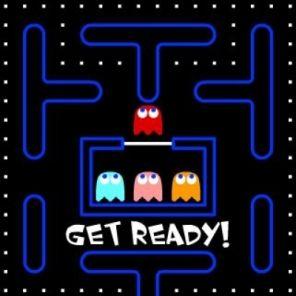Run Your Own Arcade? It's More Fun Than You Think: Learning Management Skills Through Pacman (Yes, Really!)

Ever played a store management game and thought, "Wow, this is surprisingly engaging!"? These games scratch a particular itch: the desire to organize, strategize, and watch a virtual business flourish under your guidance. But what if I told you a classic arcade game, specifically the free-to-play Pacman 30th Anniversary available, could offer a surprisingly effective (and nostalgic) way to explore some fundamental management concepts?
Sounds crazy, right? Bear with me. We're not talking about directly running a storefront, but the core gameplay loop of Pacman, when viewed through a certain lens, provides a fantastic, easily accessible sandbox for honing crucial management skills.
Let's dive in.
The Pacman Arcade: A Deliciously Simplistic Management Simulator
Forget spreadsheets and complex inventory systems. In Pacman, you are the manager of… well, your own survival within a constantly evolving maze. Think of each game as a short-term business venture with a clear goal: maximize your profit (score) while minimizing losses (lives).
Here's how the game elements translate into rudimentary management tasks:
-
The Maze: Your "Store": The maze represents your operating environment. Understanding its layout – the flow of the corridors, the strategic power pellet placements, and the predictable ghost patrol routes – is akin to understanding the demographics of your customer base and the competitive landscape. A good store manager knows their territory inside and out.
-
Pac-Man: Your "Resource": You, the player, are the primary resource. Your actions directly impact the success (or failure) of the venture. Efficient movement, quick decision-making, and resourcefulness are key.
-
Pac-Dots: Your "Inventory" and "Revenue": These are the goods you're acquiring. Each dot contributes to your overall score, representing revenue. Strategically planning your dot consumption, prioritizing high-value areas, and avoiding unnecessary detours are all about maximizing profit margins.
-
Power Pellets: Your "Power-Ups" or "Special Offers": These transformative items represent temporary advantages. Using them effectively to clear large swathes of dots or to aggressively pursue ghosts showcases your ability to leverage opportunities and maximize short-term gains. But beware, they’re temporary, so usage needs to be optimized.
-
Ghosts (Blinky, Pinky, Inky, Clyde): Your "Competitors" and "Risks": These spectral antagonists represent the inherent risks and competition within the market. They're constantly vying to disrupt your operations and reduce your resources. Effective ghost avoidance and strategic use of power pellets (your temporary competitive advantage) are crucial for survival and long-term success.
-
Fruit: Your "Bonuses" or "Special Deals": Appearing at specific points, these provide significant point boosts and represent opportunities to increase revenue through special events or promotions.
-
Lives: Your "Capital": Each life represents the amount of capital you have to continue running the "business". Losing lives is akin to bleeding money. Running out of lives is like going bankrupt.
Level Up Your Gameplay (and Your Management Skills): Essential Tips
So, how can you consciously translate your Pacman experience into valuable management insights? Try these tips:
-
Map the Market (The Maze): Before diving in, take a moment to observe the maze layout. Identify key routes, bottlenecks, and high-value dot clusters. This is akin to market research – understanding the terrain before launching a business. Practice in a safe environment or use an emulator to learn more about your game area without affecting your score.
-
Plan Your Inventory (Dot Consumption): Don't just randomly gobble up dots. Strategize your routes to maximize efficiency and minimize exposure to ghosts. This teaches you about inventory management and optimizing supply chains. Plan routes so you do not back yourself into a corner.
-
Understand the Competition (Ghost Behavior): Each ghost has a distinct personality and patrol pattern. Learning these patterns allows you to anticipate their movements and avoid unnecessary risks. This is essential for competitive analysis. Understand how fast each ghost moves to help predict their path, based on your current location.
-
Use Power-Ups Wisely (Power Pellet Strategy): Don't just activate power pellets indiscriminately. Plan your ghost-eating sprees to maximize their impact. Consider luring ghosts into tight corridors or focusing on particularly vulnerable targets. This reflects strategic use of limited resources.
-
Manage Your Capital (Life Preservation): Each death sets you back. Prioritize survival, especially early in the game. Focus on careful movement and strategic dot consumption over reckless ghost-chasing. This reinforces the importance of capital preservation.
-
Adapt to Changing Conditions (Evolving Maze): As the game progresses, the ghosts become faster and more aggressive. You need to adapt your strategies to survive. This mimics the dynamic nature of the business world, where constant adaptation is crucial for success.
-
Learn from Mistakes: Don't get discouraged by losses. Analyze why you died and identify areas for improvement. Were you too greedy? Did you misjudge a ghost's movement? Learning from mistakes is vital for growth, both in Pacman and in business.
From Arcade to Boardroom: The Value Proposition
While Pacman 30th Anniversary won't teach you the intricacies of accounting or marketing, it provides a surprisingly engaging and accessible platform for developing fundamental management skills. It forces you to think strategically, manage resources, assess risks, adapt to changing conditions, and learn from mistakes, all within a fun and nostalgic context.
So, the next time you're looking for a quick and engaging mental workout, fire up Pacman. You might be surprised at the management lessons you pick up along the way. And who knows, maybe your improved dot-munching skills will translate into a more successful real-world venture! You'll never look at a simple arcade game the same way again.
- Art
- Causes
- Crafts
- Dance
- Drinks
- Film
- Fitness
- Food
- Jeux
- Gardening
- Health
- Domicile
- Literature
- Music
- Networking
- Autre
- Party
- Religion
- Shopping
- Sports
- Theater
- Wellness


